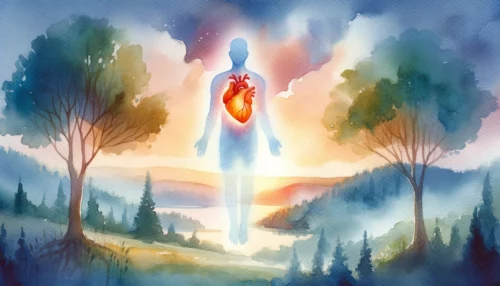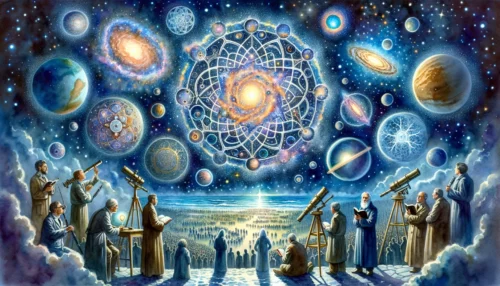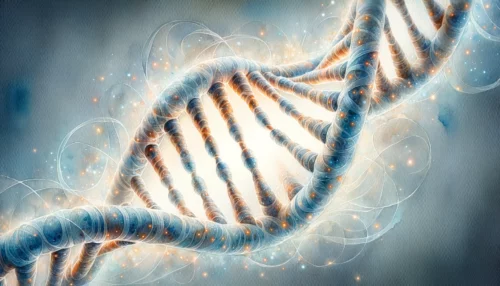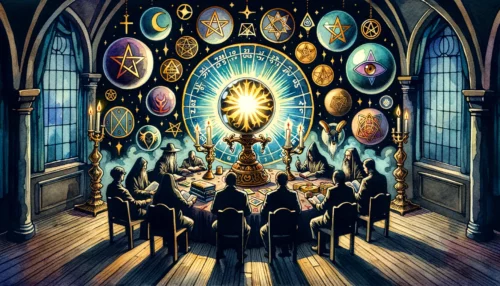This contemplation surrounds one of the core mysteries of Christian faith – the Incarnation of Christ, fully God and fully man. It’s a question that requires an understanding of the nature of sin, the characteristics of Jesus as God and man, and the implications of these concepts for our faith. By tackling this question, we hope to bring clarity and deepen our appreciation of the incomparable love and grace of God manifested in Jesus Christ.
Understanding the Dual Nature of Jesus Christ
Let’s start by taking a look at the essence of Jesus Christ as described in the Bible. A remarkable aspect of Christianity lies in the belief that Jesus Christ embodies both divine and human natures, not half God and half man, but wholly God and wholly man. This duality is not a split identity; instead, it represents a unity of God and man in the person of Jesus Christ.
Jesus’ divine nature comes from His identity as the second Person of the Holy Trinity. This divine essence embodies omniscience, omnipotence, and, of course, perfect goodness. By His divine nature, He is incapable of sin because He embodies God’s absolute holiness and purity (1 John 3:5).
His human nature, on the other hand, is represented by his birth to a human mother, Mary. As a man, Jesus felt thirst, hunger, fatigue, and a range of emotions, which are evident in various accounts of His life on Earth (John 4:6-7, Luke 22:44). He lived the human experience, yet remained without sin (Hebrews 4:15).
At the heart of this duality lies the doctrine of the Hypostatic Union, which explains that in Jesus Christ, these two natures coexist. The Chalcedonian Definition, formulated in the fifth century, holds that Jesus has two natures – divine and human – in one person and that these two natures are without confusion, change, division, or separation. This means that each nature retains its own attributes, and yet they are united in one person.
The Incarnation does not diminish Christ’s divinity or His humanity. Rather, the two are perfectly balanced in Him. His humanity allows Him to relate to our human experiences, while His divinity ensures His perfect goodness and sinlessness.
The Hypostatic Union enables Jesus, being truly man, to represent humanity, and being truly God, to bear the weight of God’s wrath against sin. Jesus had to be human to represent us and had to be God to bear our sins, making salvation possible. He embodies the perfect image of humanity, as intended by God, and the perfect image of God, as He exists eternally (Colossians 1:15).
Jesus Christ embodies both divine and human natures, known as the Hypostatic Union. His divine nature represents God’s absolute holiness, making Him incapable of sin. His human nature allows Him to relate to our experiences while remaining sinless. The union of these natures in one person is essential for Him to represent humanity and bear our sins. The Hypostatic Union does not diminish Christ’s divinity or His humanity; instead, the two are perfectly balanced in Him.
The Nature of Sin: A Biblical Perspective
Sin is a violation of God’s moral law. From the account of Adam and Eve eating the forbidden fruit (Genesis 3:1-7), we glean that sin is, at its core, rebellion against God. It’s choosing our way over God’s way, asserting our will over God’s perfect and righteous will.
Sin is a condition of the heart. The Bible talks about sin as a matter of the heart, not merely wrong actions (Matthew 15:18-19). Sin stems from selfish desires, and these desires birth sinful actions when they are contrary to God’s commands.
A crucial point about sin is that it separates us from God. God, in His absolute holiness, cannot tolerate sin, which results in a chasm between God and man. From the story of Adam and Eve’s expulsion from Eden (Genesis 3:23-24), we gather that sin results in a spiritual death, which is the ultimate separation from God.
The pervasiveness of sin is also a key biblical concept. Due to Adam and Eve’s disobedience, all of humanity is born into sin (Romans 5:12). This original sin represents a spiritual inheritance, a state of alienation from God, which humanity carries from birth.
One can’t discuss sin without mentioning the role of temptation. Temptation, in and of itself, is not sin. Temptation becomes sin when we give in and act contrary to God’s will. Jesus Himself was tempted (Matthew 4:1-11), but he didn’t sin, demonstrating that being subjected to temptation is not the same as sinning.
This understanding of sin underscores the need for a savior. Because all have sinned and fall short of God’s glory (Romans 3:23), we all need redemption. This is where Jesus comes in. By His death on the cross and subsequent resurrection, He provides a way for humanity to be reconciled to God, freeing us from the penalty of sin and restoring our relationship with God.
Sin is rebellion against God, a violation of His moral law. It’s a condition of the heart, leading to actions contrary to God’s commands. Sin separates us from God, leading to spiritual death, and its pervasiveness means all of humanity is born into this state of alienation. Temptation isn’t sin; sin occurs when we yield to temptation and act against God’s will. Given our sinful condition, the necessity for a savior emerges, a role fulfilled by Jesus through His death and resurrection.
Reconciling the Sinlessness of Christ with His Humanity
Taking into consideration the dual nature of Christ and the nature of sin, we can address the central question: Could Jesus have sinned? Based on our understanding of Jesus’ divine nature and the nature of sin, the answer is a resounding no. Why? Because sin is a violation of God’s moral law, an act of rebellion against God, and Jesus, in His divine nature, is incapable of such rebellion.
Despite being fully human, Jesus lived a sinless life. The sinlessness of Jesus isn’t just a testament to His strong moral character or self-control; it’s an inherent aspect of His divine nature. Sinlessness doesn’t merely mean that Jesus didn’t sin; it means He couldn’t sin because His divine nature couldn’t rebel against God.
Being tempted does not negate this sinlessness. As we have established, temptation in itself is not sin. Jesus was tempted (Matthew 4:1-11), indicating His genuine humanity. But He did not yield to these temptations, demonstrating His divine nature. His responses to temptation underscore His absolute alignment with God’s will, contrary to human tendency to assert our will over God’s.
Jesus’ sinlessness is central to our salvation. A savior who himself needs saving is no savior at all. Jesus, being without sin, did not need to save Himself but offered Himself as the perfect sacrifice for our sins (Hebrews 7:26-27). His sinless nature made Him the only worthy and effective offering for our sin.
The inability to sin doesn’t make Jesus’ humanity any less real. Jesus experienced the full range of human emotions and physical sensations. He felt hunger, thirst, and fatigue. He experienced joy, sadness, and even anger. Yet these experiences did not lead Him to sin. His divine nature remained intact, thus confirming the Hypostatic Union – fully God, fully man.
In Jesus, we see the perfect example of a life fully surrendered to God’s will. The struggle with temptation is not alien to Him, and yet He remained without sin. This offers hope for humanity, not because we can achieve sinlessness, but because we have a high priest who empathizes with our weaknesses and yet lived a life free of sin.
Jesus, possessing a dual nature – divine and human – could not have sinned, as sin is a rebellion against God, and His divine nature is incapable of such rebellion. His sinlessness, an inherent aspect of His divine nature, does not negate His genuine humanity, which was proven by His experience of temptation. Despite this, He did not yield to temptation, thus aligning perfectly with God’s will. Jesus’ sinlessness is central to our salvation, as it enabled Him to become the perfect sacrifice for our sins. His life serves as the perfect example of full surrender to God’s will.
The Perfect Union: Divinity and Humanity in Christ
The life of Jesus Christ is a profound testament to the balance of divine and human natures. Jesus, in His divine nature, was incapable of sin, yet in His humanity, He experienced temptation. This dual nature, essential for our redemption, shows us the possibility of living a life surrendered to God’s will. Through His sinless life, Jesus became the perfect sacrifice for our sins, bridging the gap between God and humanity caused by sin.
Here are a few personal questions for further consideration:
- How does the sinlessness of Jesus impact your understanding of His sacrifice?
- How does understanding the Hypostatic Union help you appreciate Jesus’ role as our Savior more?
- How can Jesus’ response to temptation serve as a model for dealing with our own temptations?
Let’s rejoice in the perfection of Jesus Christ, who stands as a beacon of hope. His life, marked by a unique union of divine and human natures, is a testament to God’s endless love and grace. With eyes fixed on Him, let’s strive to live a life reflecting His surrender to God’s will.














